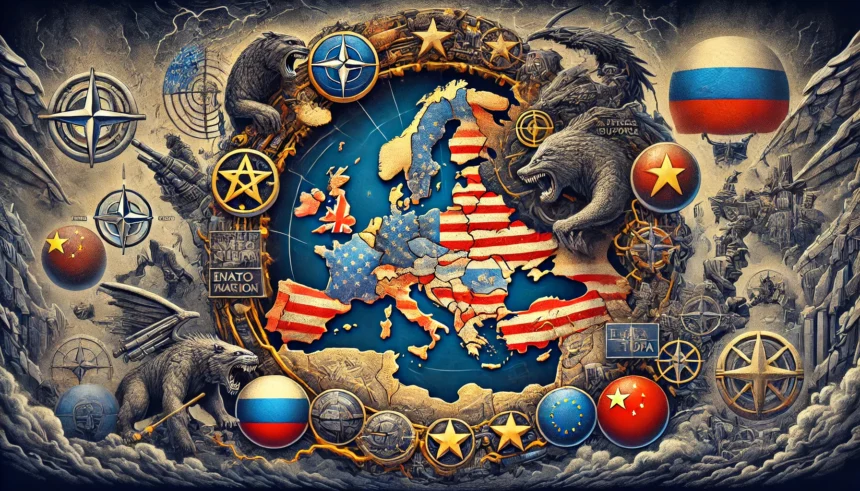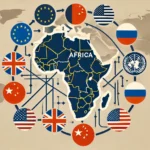Summary by Geopolist | Istanbul Center for Geopolitics:
The paper, “Europe and the End of Pax Americana,” provides a comprehensive study of the United States’ decreasing influence in global events, as well as its consequences for Europe and transatlantic ties. The report contends that the era of US-led global order, sometimes known as Pax Americana, is coming to an end, driven by both internal political transformations and external geopolitical difficulties. This collapse needs a strategic realignment for European countries, regardless of the outcome of the impending US presidential election in November 2024.
Key Topics and Arguments:
Erosion of Pax Americana:
The manifesto lays forth three major pillars that have traditionally defined Pax Americana: US military strength, economic openness, and the promotion of liberal-democratic values.
These pillars have been under growing strain in recent decades as a result of evolving global power dynamics, domestic political shifts in the United States, and the advent of new powers such as China and Russia.
The fall is not primarily due to the Trump administration, but is part of a larger, long-term pattern. Even if Kamala Harris wins the 2024 election, substantial adjustments in US global strategy would be unavoidable.
US Military Commitments and Declining Credibility:
US military superiority, a key component of Pax Americana, has always ensured the security of its allies in Europe, Asia, and the Middle East. Under this security umbrella, countries have been able to devote more resources to domestic issues rather than defense investment.
However, the paper identifies a considerable weakening of US deterrence and confidence in recent decades. For example:
In the mid-1990s, simply dispatching a few warships to the Taiwan Strait was enough to discourage China, although Russia acted more cautiously.
By 2024, China will have developed powerful anti-access/area-denial (A2/AD) capabilities, making it more difficult for the United States to project force in the Indo-Pacific. Similarly, Russia’s actions in Ukraine and Iran’s growing audacity in the Middle East have taxed the US resolve.
According to the paper, while the United States remains the world’s greatest military spender, the cost of maintaining a global military presence, as well as the necessity to fight different regional threats, has weakened the country’s overall strategic efficacy.
If Donald Trump is re-elected, his “America First” policy may result in additional reductions in US commitments, requiring Europe and other allies to cover the security gap.
Economic Shift From Openness to Geoeconomics
Traditionally, US-led economic openness has been viewed as a source of global prosperity and stability, supported by institutions such as the Bretton Woods system and the General Agreement on Tariffs and Trade (GATT).
The development of neoliberalism in the 1970s pushed this emphasis toward deregulation and liberalization, but over the last two decades, the model’s weaknesses have become obvious, particularly with China’s ascension to global economic superpower status.
The report identifies a new paradigm of “geoeconomics,” in which economic policy is increasingly directed by strategic and security considerations rather than a commitment to free trade and open markets.
This move was underscored by Trump’s aggressive use of tariffs and penalties, even those against longstanding allies. The Biden administration has continued this pattern, albeit with a less combative tone.
The consensus on economic protectionism now has bipartisan backing, and the new economic paradigm is projected to last, making future transatlantic economic cooperation more difficult.
Values-based conflicts and the rise of authoritarianism:
The United States’ foreign policy has long been based on promoting liberal-democratic ideas, with the assumption that democratic administration results in more harmonious international relations.
However, this notion is gradually being challenged. The document notes that, rather than promoting peace, values-based policies have occasionally increased tensions, as evidenced in conflicts with Russia and China.
Under Putin, Russia sees the development of Western democratic values in its neighboring countries as a direct challenge to its authoritarian government. Similarly, China’s Xi Jinping is promoting its own values-based international framework that prioritizes economic development and state sovereignty over individual rights.
The United States is engaged in a “systemic conflict” with these powers, which is motivated not only by geopolitical interests but also by fundamentally opposed worldviews.
A second Trump presidency might erode America’s commitment to preserving liberal-democratic norms around the world, potentially putting strategic stability ahead of ideological agreement. This could temporarily reduce tensions with Russia and China, but it would undermine the security and values foundation that has long supported US-European relations.
European autonomy and strategic realignment:
The manifesto contends that Europe must reconsider its security plans and move toward more autonomy. With the loss of American commitment, the reliability of US military backing is called into question.
This move has significant repercussions for NATO. While the alliance is unlikely to collapse, Europe may have to take on greater duties, particularly in areas where it has traditionally relied on US capabilities, such as strategic airlift, reconnaissance, and missile defense.
A Trump administration might exacerbate this trend by advocating for a more transactional approach to NATO, focused solely on nuclear deterrence and expecting Europe to address conventional challenges independently.
Even under a Harris administration, Europe would have to prepare for a less prominent US involvement in global security, given the increasing need for US resources in the Indo-Pacific and internal political limits.
Geoeconomic and Technological Challenges in Europe:
The study also underscores the growing economic and technological challenges that Europe faces as a result of the United States’ new geoeconomic policies.
The Biden administration has urged Europe to minimize its reliance on Chinese technology and supply lines. However, given Europe’s economic links to China, complete decoupling is viewed as unachievable.
Trump’s return is likely to compound these issues, as his administration will push for more forceful economic separation and may even impose taxes or sanctions on European corporations judged excessively reliant on China.
This would provide a quandary for European countries such as Germany, who are strongly interwoven into the global economy and rely on Chinese markets for their green energy and industrial programs.
Transatlantic Relations: Recalibrate or Rethink?
The future of transatlantic ties will be significantly influenced by how Europe responds to the evolving position of the United States. The document proposes two basic approaches:
Recalibrate: Improve Europe’s defense capabilities while keeping a close, albeit modified, relationship with the United States. This would entail more equal burden sharing within NATO and increased European leadership in regional security.
Rethink: Create a more autonomous European security architecture, possibly outside of NATO, if the US dramatically decreases its role or behaves unpredictably under a new government.
Regardless of which course is taken, Europe will need to become more politically cohesive and strategically flexible to deal with a world in which the cohesive States is no longer the undisputed leader of the liberal order.
Conclusion:
The text finally calls on Europe to prepare for a post-Pax Americana world in which US obligations are less secure and the transatlantic relationship becomes more transactional. It underlines the importance of a stronger and more autonomous European military policy, increased political unity, and a clear plan for negotiating the expanding difficulties of global geoeconomics and values-based conflicts. Whether under Trump or Harris, the US is no longer a stabilizing factor, and Europe must adjust to this new reality.
Read the full article below.







